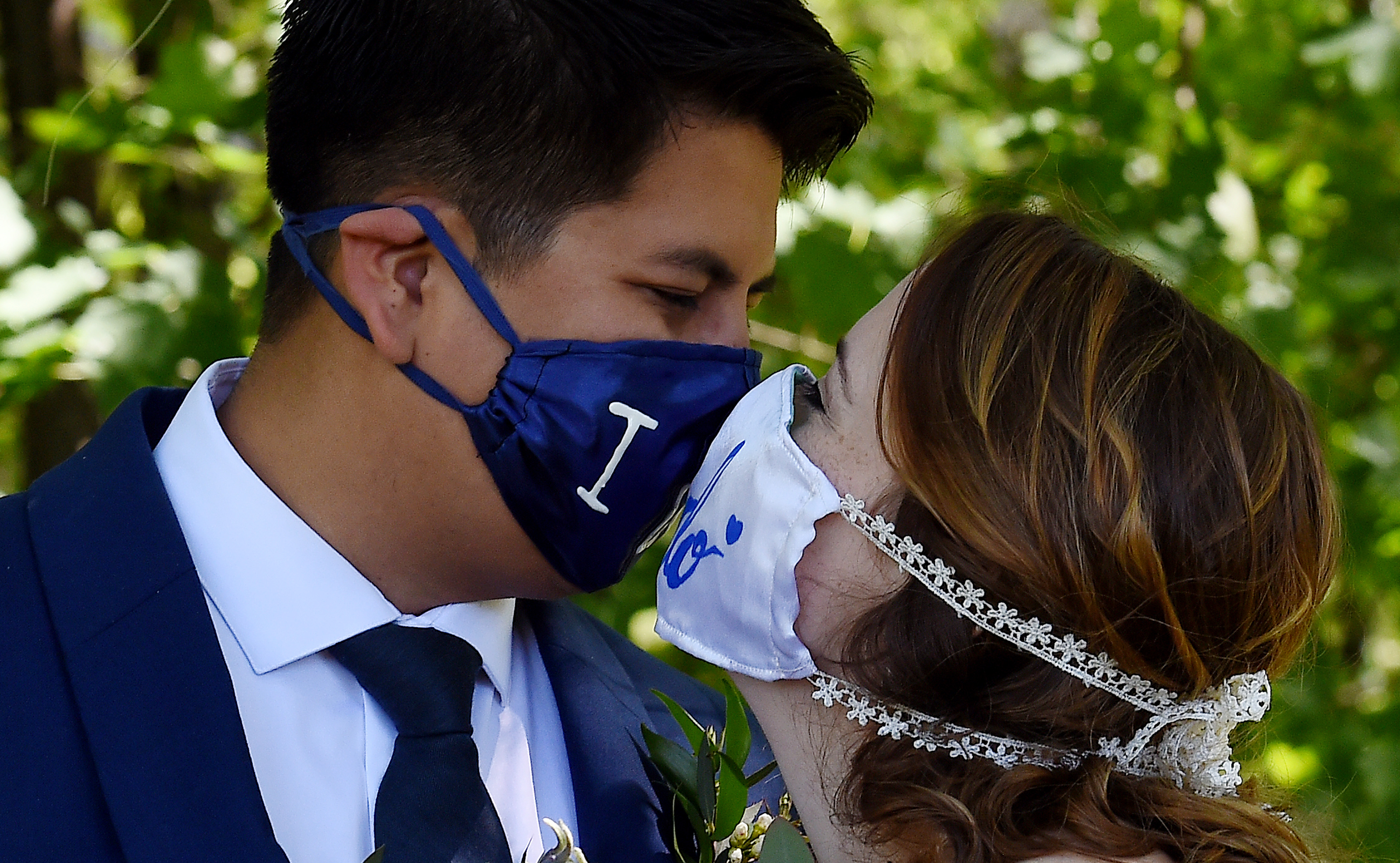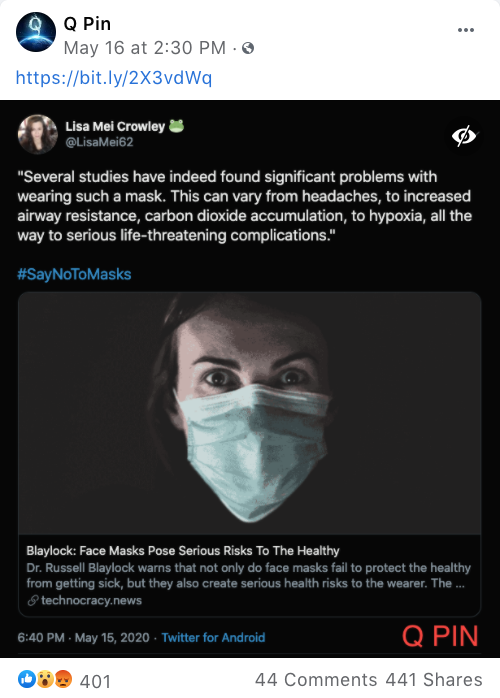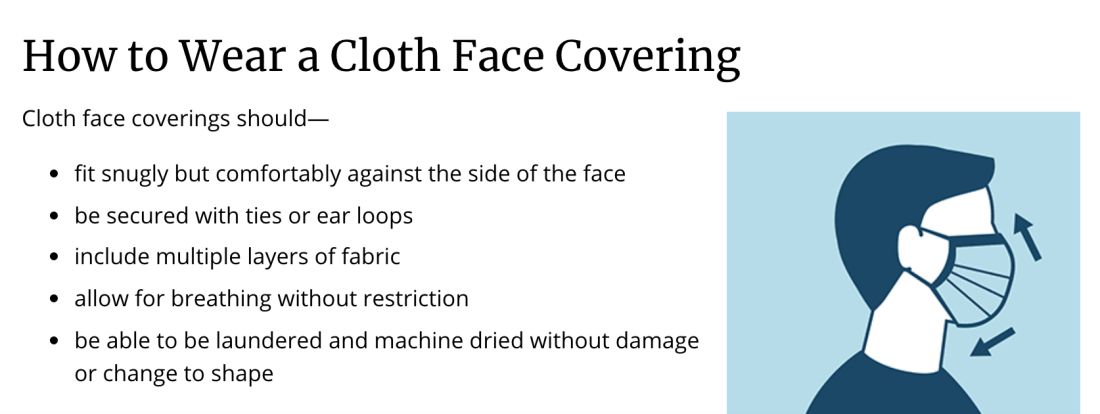
Misleading article warns against face masks during COVID-19 pandemic
- This article is more than five years old.
- Published on May 19, 2020 at 23:08
- Updated on September 2, 2020 at 16:57
- 4 min read
- By Claire SAVAGE, AFP USA
“Dr. Russell Blaylock warns that not only do face masks fail to protect the healthy from getting sick, but they also create serious health risks to the wearer,” a note at the beginning of the May 11, 2020 article says. “The bottom line is that if you are not sick, you should not wear a face mask.”
It has been shared on Facebook more than 24,000 times and tweeted to more than two million followers, according to social media tracking tool CrowdTangle, and also appears on other sites as adapted or re-published content.

It was written by Blaylock, whose medical license is currently expired in Mississippi, North Carolina and South Carolina.
“If you are asymptomatic you should wear a mask, and since you can't tell if you are asymptomatic, everyone should wear a mask,” Dr. Jonathan Karn, director of the Cleveland COVID Task Force, told AFP by email.
“It seems to be an extremely good bet that a cloth mask will limit transmission from asymptomatic people to people in their vicinity,” he said, pointing to a study that found cloth barriers to be beneficial in protecting mice from droplet spread.
Karn, of Case Western Reserve University School of Medicine, also noted that a rigorous population study has yet to be done.
Dr. Shelley Payne, director of the LaMontagne Center for Infectious Disease at the University of Texas at Austin, said that by the article’s own admission, an unusual characteristic of COVID-19 is that many carriers are asymptomatic.
“Without very large-scale testing, we don’t know who is infected and who is not,” she said via email.
And Professor Yuen Kwok-yung, one of the world's top coronavirus experts, told reporters that “it’s very clear that the effect of masking the infected, especially when they are asymptomatic -- or symptomatic -- it's much more important than anything else.”
The article cites several risks of prolonged use of N95 masks to support the idea that wearing a mask can be problematic.
“The main argument seems to be that N95 respirators can’t be easily worn for long periods of time, which any medical person or researcher knows from personal experience,” Karn said.
However, N95 masks are explicitly not recommended for the general population by the US Centers for Disease Control and Prevention (CDC), Karn said.
Cloth masks are recommended instead, except for children under age two and people with breathing problems.
They “will not, unfortunately, provide reliable protection against acquisition of infection,” said Karn, but that is not the aim.
A face covering “is not intended to protect the wearer, but it may prevent the spread of virus from the wearer to others,” the CDC says.

The article claims that another risk of face masks is that “the exhaled viruses will not be able to escape and will concentrate in the nasal passages, enter the olfactory nerves and travel into the brain.”
Karn said that while it is true that the virus can potentially infect neurons and in some cases enter the central nervous system, “it is wrong to say that the virus is trapped by the mask and would then get additionally concentrated in the nasal passages.”
The article is also incorrect in its assertion that this review of 17 studies did not find a conclusive relationship between mask or respirator use and protection against influenza infection, Payne said.
“The conclusion of the review was not that masks are ineffective,” she explained. Rather, the study -- an analysis last updated in January 2011, years before the novel coronavirus emerged in China -- “points out that carefully controlled studies to determine the effectiveness of masks in prevention of influenza have not been conducted.”
Some of the studies reviewed indicated that masks can indeed help limit spread of respiratory infections, according to Payne.
“Retrospective studies of SARS infections, which are caused by a virus that is... more closely related to SARS-CoV-2 than is influenza virus, showed lower frequency of SARS among health care workers who consistently wore masks,” she said, while noting that, as the review points out, the studies had relatively small numbers.
AFP Fact Check has addressed several other misleading claims about face masks, available here, here and here, and has debunked more than 450 examples of false or misleading information about the novel coronavirus. The complete list of our fact-checks on the topic in English is here.
Copyright © AFP 2017-2026. Any commercial use of this content requires a subscription. Click here to find out more.
Is there content that you would like AFP to fact-check? Get in touch.
Contact us




